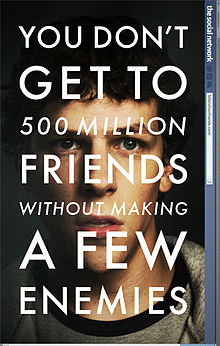
Near the end of The Social Network, Mark Zuckerberg is worried that the legal proceedings are making him look like the bad guy. So the young lawyer played by Rashida Dati (whom my wife and I have come to know from watching the US version of The Office) assures him that whenever emotional testimony is involved in a case, she automatically assumes that 85% of it is exaggerated and 15% of it is pure perjury. As strange as it seems, all clues point to the writer deliberately inserting this phrase to refer to the film itself.
I’d put off watching this for a very long time even after reading numerous favorable reviews of it. I kept thinking, “It’s a movie about a kid in college building a gigantic social networking website. How entertaining could it be?” I was wrong because this turned out to be one of the most riveting and entertaining films I’ve watched in recent memory. But a quick check on Wikipedia suffices to reveal that it achieves this by the simple expedient of taking tons of liberties with the facts. Even its writer Aaron Sorkin admits that he wanted to tell an interesting story first and foremost and this film isn’t meant to be a historically accurate documentary.